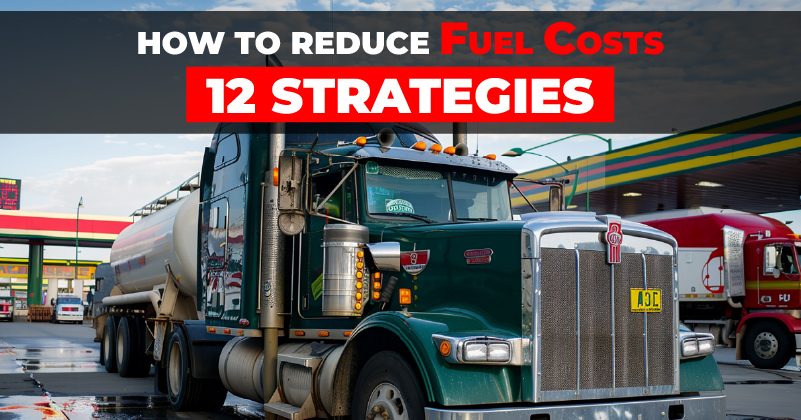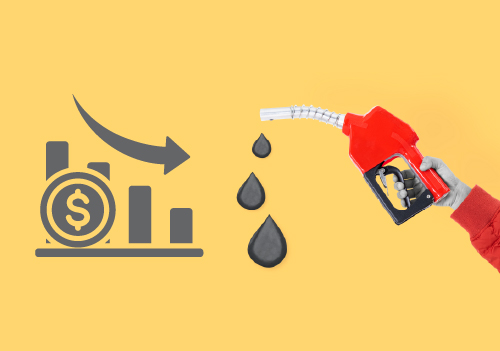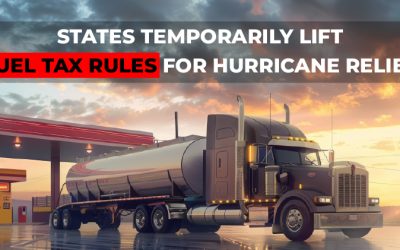
As of March 2024, the national average price for diesel fuel in the U.S. exceeds $4.00 per gallon, making fuel one of the most significant expenses for fleet operators—accounting for up to 40% of total operating costs. For modern fleets, reducing these costs isn’t just a goal; it’s a necessity. By adopting simple yet effective strategies, here’s how to reduce fuel costs, optimize fleet operations, and achieve substantial fuel savings.
12 Proven Ways to Reduce Fleet Fuel Costs
Reducing fuel costs is critical to staying competitive in today’s fast-paced logistics landscape. Here are 12 strategies your fleet can implement to lower expenses and improve operational efficiency:
-
Enhance Driver Training
Driver training programs are a cornerstone of fuel savings. Training should emphasize efficient driving techniques like controlled acceleration, smooth braking, adherence to speed limits, reduced idling, and strategic use of cruise control. By promoting these habits, you not only cut fuel consumption but also enhance driver safety.
-
Invest in Fuel-Efficient Vehicles
Upgrading to modern, fuel-efficient vehicles with hybrid technology, aerodynamic designs, and optimized engines can reduce fuel costs over time. While these vehicles may come with higher upfront costs, their long-term savings make them a worthwhile investment. Consider factors like fuel economy ratings and operational needs when choosing new fleet additions.
-
Schedule Regular Maintenance
Routine vehicle maintenance ensures optimal performance. Focus on regular engine checks, oil changes using “energy-conserving” grades, and clean air filters. These practices enhance fuel efficiency, prevent breakdowns, and reduce repair costs.
-
Monitor Tire Pressure
Maintaining proper tire inflation can improve fuel efficiency by up to 3%, according to the National Highway Traffic Safety Administration. Frequent checks are vital, especially during seasonal temperature changes. Proper tire pressure also extends tire life and ensures better vehicle performance.
-
Reduce Vehicle Weight
Lighten the load wherever possible. Remove unnecessary items, reorganize cargo for better aerodynamics, and consider replacing heavier components with lighter materials like aluminum. These steps can significantly enhance fuel economy.

-
Optimize Route Planning
Advanced GPS-based route optimization software helps minimize unnecessary mileage by accounting for traffic, road conditions, and weather. Regularly review and adjust routes to maximize efficiency and save fuel.
-
Leverage Telematics Systems
Telematics systems provide real-time insights into driver behavior, vehicle diagnostics, and fuel consumption. Use this data to address issues like excessive idling, aggressive driving, and overdue maintenance, ensuring efficient fleet performance.
-
Adopt Alternative Fuels
Consider transitioning to alternative fuels like biodiesel, ethanol, or natural gas. These options are often more cost-effective and eco-friendly than traditional fuels, helping you reduce both costs and your environmental footprint.
-
Limit Unnecessary Idling
Idling wastes fuel and accelerates engine wear. Telematics software can monitor idling times and alert drivers to turn off engines during prolonged stops, leading to significant savings.
-
Control Speed Limits
Excessive speeding increases fuel consumption and safety risks. GPS and telematics systems can enforce speed limits and generate reports on driver behavior, enabling corrective action and improved compliance.
-
Negotiate Fuel Discounts
Partnering with fuel providers can secure exclusive discounts and fleet card benefits, which streamline spending and reduce costs. Fleet cards also help monitor fuel usage and prevent unauthorized purchases.
-
Track and Analyze Fuel Usage
Fleet management tools make it easier to monitor fuel expenses and identify inefficiencies. Regular analysis provides actionable insights to address trends, optimize fuel consumption, and cut costs.
Conclusion: Why TMS-Digital?
Fuel costs may seem like an unavoidable expense, but with the right strategies and tools, they can be managed effectively. From advanced route planning to telematics and fuel-efficient vehicles, implementing these changes can help your fleet save money and boost profitability.
At TMS-Digital, we empower fleets with cutting-edge solutions to tackle fuel challenges head-on. Our fleet management tools integrate route optimization, driver monitoring, and real-time analytics to improve fuel efficiency and enhance operational performance.
Ready to Reduce Your Fleet’s Fuel Costs? Contact TMS-Digital today for a personalized consultation and demo of our fleet management solutions. Let us help you take control of your fuel expenses and drive your fleet’s success forward.









